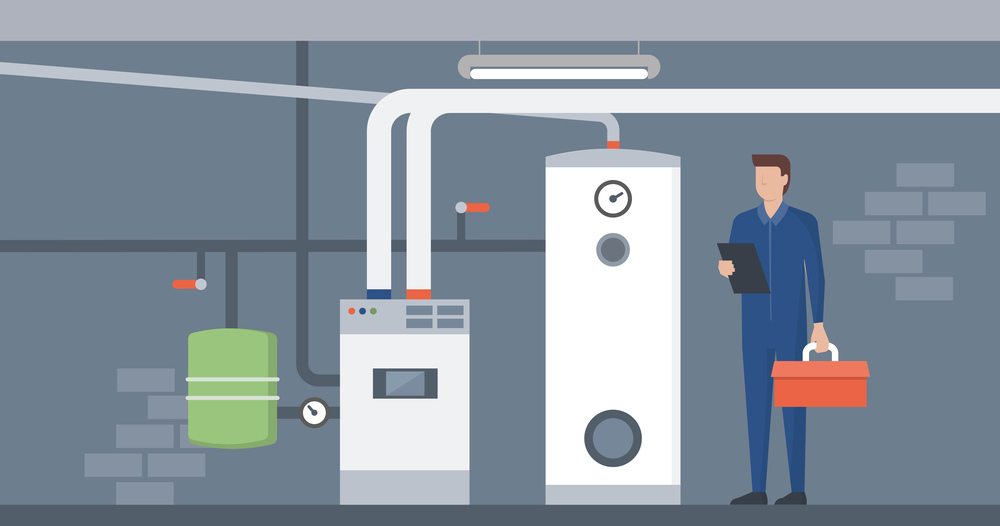
As the cost of energy increases, it becomes more and more essential to save money when running your heating and cooling systems. If the cost of using your heating system has caused some distress during the winter, it may be time to upgrade to a newer, more efficient system. There are many types of systems to choose from, but you may benefit from a highly efficient boiler in your home.
But when is the right time to install a high-efficiency boiler? If your current boiler is more than 10 years old, it may be more cost-effective in the long run to purchase a new, more efficient heating system for your home.
Check out the Home Comfort Solutions Guide for more information about the advantages of switching to a high-efficiency system. Additionally, you should work with an experienced technician who can help you find the right unit for your home.
What Is a High-Efficiency Boiler?
A high-efficiency boiler is designed to maximize the unit’s energy efficiency while reducing its fuel consumption. These boilers commonly utilize electronic ignition systems, eliminating the need for a continuously burning pilot light, which can be costly. The absence of a pilot light contributes to increased efficiency by conserving energy.
Additionally, high-efficiency boilers incorporate advanced technologies that enable them to produce the same amount of energy using less fuel compared to traditional models. This results in cost savings for the user while minimizing environmental impact.
How a Boiler’s Efficiency Is Measured
Annual Fuel Utilization Efficiency, or AFUE, measures a boiler’s efficiency. This figure is expressed as a percentage of the heat produced out of the entire amount of energy consumed. A perfectly efficient boiler would have a 100 percent AFUE. According to Energysavers.gov, high-efficiency boilers have an AFUE between 90 and 97 percent.
In contrast, mid-efficiency boilers typically have an AFUE between 80 and 83 percent, and low-efficiency boilers run between 68 and 72 percent. If you replaced your 70 percent AFUE boiler with a 90 percent AFUE boiler, you would save approximately $22 per $100 of fuel costs annually.
Upgrading from a 70 percent AFUE boiler to a 90 percent AFUE boiler means that you would be conserving 20 percent more energy. We can explain more about the advantages of high-efficiency boilers, especially when measuring boiler efficiency.
Boost your energy savings by installing a boiler with a high AFUE rating. Make sure to find one that meets your needs and will work well with your home.
What Are the Benefits of a High-Efficiency Boiler System?
It goes without saying that a new high-efficiency boiler reduces the energy consumption of your system. There are also many other long-term advantages. Take a look at some of the benefits of a high-efficiency boiler:
- Significant Cost Savings: With improved fuel efficiency, homeowners can encounter cost savings over time. High-efficiency boilers contribute to lower heating expenses, making them a cost-effective investment in the long run.
- Minimized Environmental Impact: By using less fuel to generate heat, high-efficiency boilers help reduce carbon emissions and minimize environmental impact. This makes them a more environmentally friendly selection compared to traditional boilers with lower efficiency ratings.
- Enhanced Comfort: High-efficiency boilers often provide more consistent and reliable heating, ensuring a comfortable indoor environment. Its advanced technology allows for accurate temperature control and even heat distribution.
- Longer Lifespan: These boilers are typically built with durable materials and advanced components, contributing to a longer operational lifespan. This longevity translates to fewer replacements and reduced maintenance costs over time.
How Much Does a High-Efficiency Boiler Cost?
When upgrading to a high-efficiency boiler, you need to consider both the cost of the unit as well as the cost of labor. A high-efficiency boiler cost range is typically between $3,000 to $7,000. This is dependent on the brand, size, and additional features of the unit. While it might be tempting to pick the cheapest unit, it’s important to see if it will meet your home’s needs.
Labor costs for replacing a boiler can range from $500 to $1,200. Professional installation is paramount when replacing a boiler. Since the technicians need to remove the old unit and safely install and test the new one, the process can take as little as four hours. An improperly installed boiler can lead to efficiency losses, increased energy consumption, and potential safety hazards.
In total, upgrading to a highly efficient boiler can cost you roughly between $3,500 to $8,200. Paying upfront can be intimidating, which is why some HVAC companies offer financing options to help you out. You can create a payment plan that meets your needs, so you don’t have to stress about the upfront cost.
If you need help with a boiler replacement or any other heating services in Northern Indiana and Southwestern Michigan, turn to our professionals at Home Comfort Experts. We can help you find the right boiler for your home and install it for you.
Contact us today to schedule an appointment with our team.



